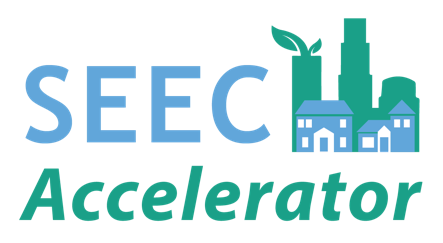What?
The SEEC Accelerator program provides targeted technical assistance to local governments with varied levels of technical expertise, experience, and capacity to develop climate action plans, track and measure progress on reducing Greenhouse Gas emissions, implement energy efficiency and sustainability projects, leverage additional funding resources, and achieve statewide recognition for energy efficiency and climate achievements. The program pays particular attention to local governments that serve disadvantaged/low-income communities and rural-hard-to-reach (RHTR) communities.
Why?
Recognizing the varied progress among local governments and value of local government partnerships with utilities, the Statewide Local Government Energy Efficiency Best Practices Coordinator (BPC) along with the members of the Statewide Energy Efficiency Collaborative (SEEC) have developed a program to accelerate implementation of local climate action planning and implementation efforts including energy efficiency and sustainability projects. Although some communities have made great achievements towards climate action, progress towards statewide climate goals is uneven and in some cases showing signs of slowed progress as noted in the State of Local Climate Action: California 2016 report.
Local Governments Leading by Example
The Statewide Energy Efficiency Strategic Plan calls on local governments to lead by example in promoting energy efficiency as a resource to support energy savings and reductions in GHG emissions.
Disadvantaged and Low-Income Communities
- Poverty is not evenly distributed throughout California; the San Joaquin Valley and some areas in Northern California have the greatest concentration of low-income households.
- Lack of program coordination across multiple services can contribute to limited participation in energy efficiency and clean energy programs
- Promoting energy equity means striking a balance between social justice and climate change mitigation
Rural Hard to Reach Communities
- limited access to utility-based energy efficiency and renewable energy programs.
How?
Local governments face numerous challenges in the implementation of energy and climate related projects. Experience, staff capacity, and budget are three of the major constraints that limit local project implementation. The Accelerator addresses these major constraints though the actions below to support the successful implementation of energy and climate projects at the local level.
- Tracking and measurement of energy savings and emissions
- ClearPath GHG Inventories
- CAP mitigation strategies
- CAP template
- Grant writing support
- Peer-to-peer mentorship
- Leveraging resources
- Temperate resilience tool
- ClearPath tool
- SEEC Forum
- Local Government Partnerships
Pilot Stage
In the initial year of 2018, the SEEC Accelerator Program focused on several pilot cities across California, with a primary focus on the Central Valley. The cohort model saw limited participation, but the response from targeted outreach presented the opportunity to pilot the Accelerator. ICLEI, one of the three SEEC NGOs, worked with the BPC to identify potential candidates and assess the needs of the community.
City of Arvin was one of the pilot communities. The SEEC NGOs connected with Christine Viterelli, City of Arvin’s Grant Manager. Christine was serving as de facto sustainability manager by pursuing grant opportunities that supported energy efficiency, renewable energy, zero emissions vehicles, and urban greening. Their city budget deficit combined difficulties obtaining match funding resulted in limited staff capacity and funding to implement projects and conduct thorough community engagement.
The City identified municipal buildings energy efficiency and renewables upgrade as a top need, particularly the community center to get more energy efficient HVAC systems and insulation since it doubled as the City’s cooling center during heat waves. Solar would help offset operation costs in light of budget deficit. The SEEC NGOs identified the PG&E Resilience Communities 2018 grant as an opportunity to quickly implement EE and solar while leveraging SEEC and LGP resources. They facilitated partnerships with San Joaquin Valley Clean Energy Organization, GRID Alternatives, Adaptation Services Group, and Kern Energy Watch, and gave technical assistance in applying to the grant.
In addition to this work, the SEEC NGOs worked with Cities of Stockton, Fresno, Arvin, San Jose, and Huron to complete a community GHG inventory for them. A GHG inventory is a key component for grants, energy tracking, and climate action planning, but requires a fair amount of technical knowledge and capacity to complete that frontline communities often do not have. The SEEC NGOs were able to complete the inventories for Stockton and Fresno, and are in progress with San Jose, Huron, and Arvin.

